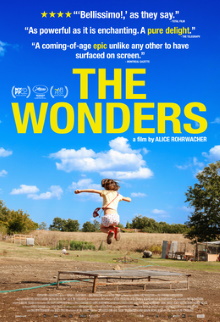
This Italian film by Alice Rohrwacher was good enough to be noted by critics and actually won the Grand Prix at the Cannes Film Festival. However I felt that while it has some potential it is fundamentally ill conceived, torn between multiple themes and storylines that aren’t complementary. It compares particularly poorly with Honeyland in that both are about honey gatherers in the countryside. But the newer film has far better cinematography and a coherent vision, even if it may not be one I agree with.
Gelsomina and her family live on a farm and as the eldest of four sisters, she is kept busy helping her father Wolfgang with his beekeeping duties. One day while the family is at the beach, they discover that a film crew is shooting a television show nearby. It is for a competition that showcases the products of regional farmers with the winner being awarded a sizable sum of money. Gelsomina is immediately interested, seeing in this perhaps a chance to better their lives or escape their poverty, while being enchanted by the beautiful hostess of the show. However Wolfgang is adamantly opposed. He does take on a young boy, Martin, as extra labor on the farm to help with the honey production. He is a juvenile delinquent and the government will be paying them a stipend for taking care of him but he is withdrawn and uncommunicative, his behavior hinting of being abused in the past. But Gelsomina grows close to the boy and later registers the family for entry into the competition without telling anyone else.
One problem that I had with Honeyland is that it presents a highly romanticized view of rural life. So one thing about The Wonders that I do like is that it doesn’t shy away from the abject poverty and deprivation of farm life or the huge amount of work that it takes to run a farm. They do of course have their moments of happiness and things to be grateful for but Gelsomina’s perspective here is one of longing for something more from life and of envying richer friends who seem to live in town. Her father is her polar opposite who resents change of any kind and takes on a hostile attitude to any outsiders who say that they are trying to help, such as the producers of the television show. This film mostly sides with Gelsomina, portraying Wolfgang as a tyrannical patriarch of the family and prone to making absurd decisions. The fact that having the two elder sisters do so much potentially dangerous work amounts to illegal child labor when they should instead be in school doesn’t incline the audience towards sympathy for the father either.
But this film isn’t just about that particular tension. It’s also a coming of age film as Gelsomina develops drives and interests separate from that of her parents. Martin’s inclusion in the story as a delinquent that the family rehabilitates adds another layer of complication to the story. I’m sure that I’m missing something as well in how Italian, German and French are variously used. Most of the film is in Italian, but Wolfgang and his wife speak in French when it is just the two of them. Wolfgang speaks German with the authorities when discussing the family’s hosting of Martin and I believe that, with his name, means that he is originally from either Germany or Austria. If that’s correct, that means there is a thread of mockery in here as well as one of the themes here is searching for the true Etruscans who live in the region. Maybe in the hands of another director, this profusion of topics and themes would be mutually reinforcing and convey a powerful sense of the film’s sweeping ambition. But here the disparate themes just seem to sap the energy from one another.
From what I can tell this is more realist take on rural life because it’s at least partially based on the director’s own childhood. But taken as a whole it’s just not compelling enough to make for a great film and it can’t even boast of beautiful cinematography. It has its merits but I think it’s ultimately a miss.